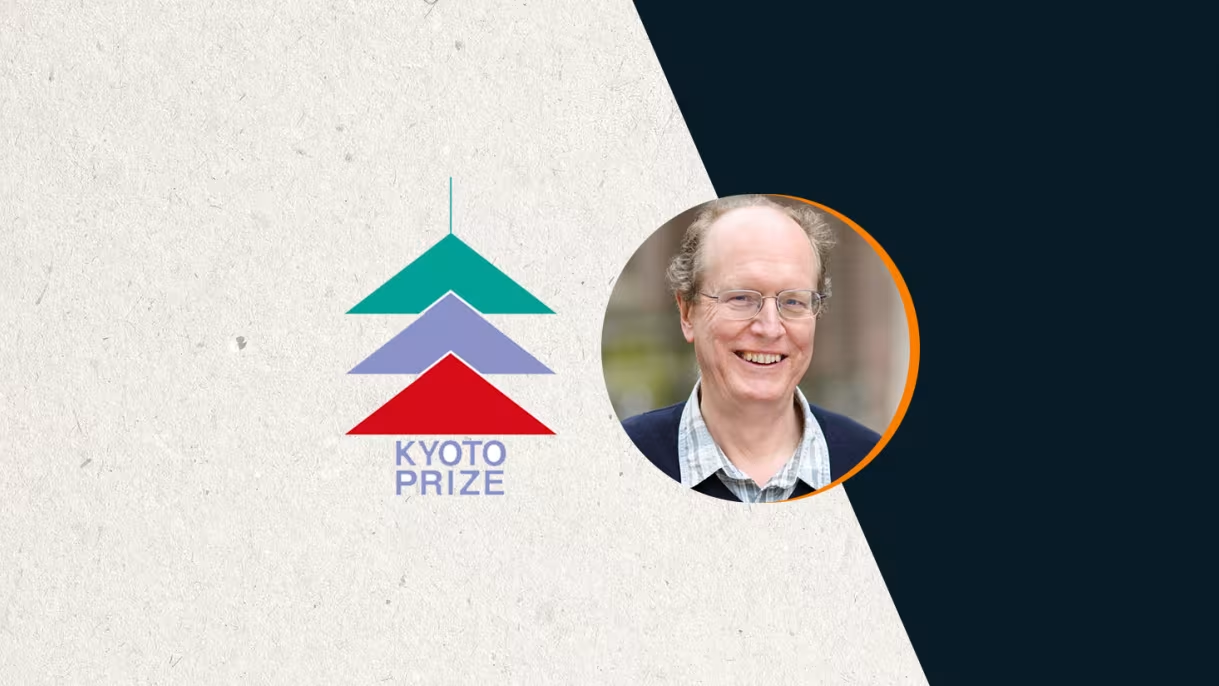

Princeton Biologist Bryan Grenfell Wins Kyoto Prize
Princeton University’s Bryan Grenfell, the Kathryn Briger and Sarah Fenton Professor of Ecology and Evolutionary Biology and Public Affairs, is one of three recipients of the Kyoto Prize in 2022. He won the basic science category, for “development of an innovative methodology for integrative analysis of pathogen evolution and epidemics.”
The Kyoto Prize, a major international distinction, is presented by the Inamori Foundation of Japan to honor the lifetime achievements of those who have contributed significantly to the scientific, cultural and spiritual betterment of humankind. The award, which is presented annually in the categories of basic science, advanced technology, and arts and philosophy, includes a cash prize of 100 million yen, or approximately $735,000.
“Bryan is a leading expert in infectious disease dynamics, and his work continues to influence infectious disease control policies around the world,” said Amaney Jamal, dean of the Princeton School of Public and International Affairs (SPIA). “His efforts are part of an excellent and groundbreaking portfolio of global research at SPIA, and he is so deserving of this prestigious award.”
In their award citation, Inamori explained that pathogens — the bacteria, viruses and other microorganisms that cause disease — threaten many humans and other organisms. Vertebrates have developed adaptive immunity that prevents reinfection with the same pathogen, but some pathogens can mutate to evade host immune responses — just as the coronavirus that causes COVID-19 has mutated into Delta, Omicron and other variants. In 2004, Grenfell proposed “phylodynamics,” a new methodology that predicts the epidemic dynamics of RNA viruses by considering viral evolution; this led to a new research field that integrates immune dynamics, epidemiology and evolutionary biology.
“It has been a privilege and pleasure to spend my career exploring the spatiotemporal dynamics and evolution of infectious disease epidemics, and the impact of control measures,” said Grenfell, who is also associated faculty in the High Meadows Environmental Institute (HMEI) and a leader in HMEI’s Climate Change and Infectious Disease Initiative, which has published numerous studies on the dynamics of COVID-19, including the influence of masks and climate on the spread and control of the disease.
“Princeton — particularly through the interdisciplinary research cultures inherent in the Department of Ecology and Evolutionary Biology, the High Meadows Environmental Institute and the School of Public and International Affairs — has been a wonderful place to pursue these questions through close collaboration with brilliant scientists and scholars across disciplines,” he said. “I am especially lucky to have had inspiration and friendship from many exceptional mentors, collaborators, colleagues and students; this award reflects their insights and dedication as much as my own work. I am deeply grateful to the Inamori Foundation and profoundly honored to have my research considered worthy of a Kyoto Prize.”
Born in Swansea, United Kingdom, in 1954, Grenfell received his Ph.D. from the University of York in 1981. After positions at Imperial College-London, the University of Sheffield, the University of Cambridge and Pennsylvania State University, he came to Princeton in 2009. Among other awards, he has received the T.H. Huxley Medal of Imperial College-London and the Scientific Medal of the Zoological Society of London, and he is a member of the American Academy of Arts and Sciences, the American Association for the Advancement of Science, and the Royal Society.
This is the fourth time that the Kyoto Prize, established in 1985, has gone to a Princeton faculty member. In 2019, astrophysicist James Gunn, the Eugene Higgins Professor of Astronomy, Emeritus, and an emeritus professor of astrophysical sciences, won the basic science award for his “outstanding contributions” to cosmology; his work has had a major impact on theory, observation and instrumentation, helping to establish the current understanding of how galaxies form, the properties of intergalactic space, the large-scale structure and evolution of the universe, and many other fundamental breakthroughs. In 2009, husband-and-wife-team Peter and B. Rosemary Grant, whose legendary explorations in the Galápagos Islands have produced an array of dazzling insights into evolutionary theory, were jointly awarded the prize. In 2005, Simon Levin, the George M. Moffett Professor of Biology, won the basic science award for his leading contributions to environmental science. Also in 2005, George Heilmeier, the inventor of liquid crystal display technology and a 1962 Princeton graduate alumnus, won in the advanced technology category.
Grenfell and the other 2022 laureates — Carver Mead of the California Institute of Technology (Caltech) and Zakir Hussain, a leading tabla player of Hindustani music — will receive a diploma and a Kyoto Prize medal in addition to the prize money.
“A human being has no higher calling than to strive for the greater good of humanity and the world,” said Kazuo Inamori, founder of the Inamori Foundation. The Kyoto Prize was born out of his wish to “contribute to the progress of the future of humanity while maintaining a balance between the development of science and civilization and the enrichment of the human spirit.”

